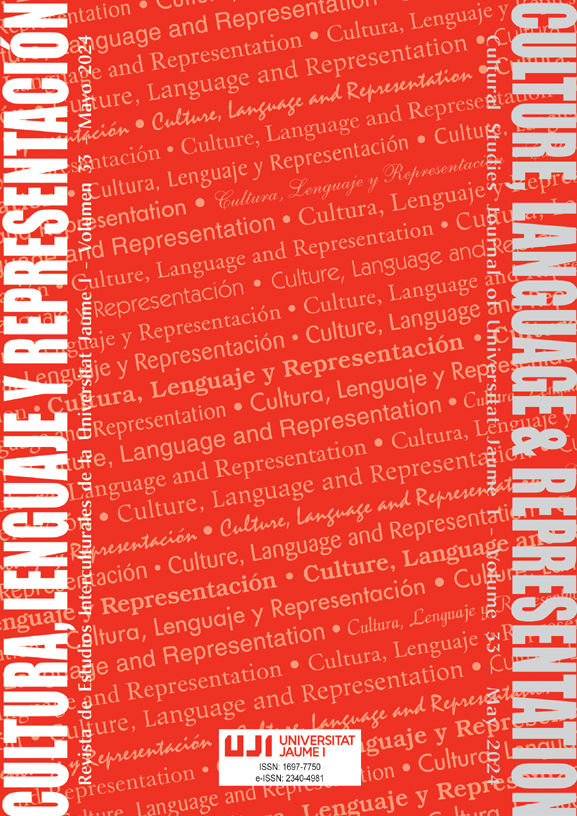When Presidents Write about Their Lives: Problems and Perspectives of the Political Autobio-graphy in Spain
Main Article Content
Abstract
This article addresses a successful publishing phenomenon in Spain, namely political memoirs, aiming to propose an interdisciplinary methodological perspective that allows for a critical approach to this type of text. The corpus focuses specifically on three texts published by sitting or former presidents: En confianza. Mi vida y mi proyecto de cambio para España (2011); Una España mejor (2019) by Mariano Rajoy, and Manual de resistencia (2019) by Pedro Sánchez. Analyzing these three works will provide an interdisciplinary perspective that, stemming from literary theory, will contribute to reflecting on the nature of the «memoir» genre within these types of works, alongside the constraints arising from the reader-author pact they establish and the issues of authorship they present. Secondly, discourse analysis, oriented towards political communication in particular, will provide the main tools for analyzing the self-representation and personalization of the protagonists, building upon the concept of ethos and the pragmatic analysis of enunciation. Finally, the perspective of governmentality studies (developed within the realm of cultural studies) will guide the analysis of the political rationality depicted in such texts, in line with the neoliberal regime of subjectivity in which they are situated.
Downloads
Article Details
An open-access CREATIVE COMMONS copyright license is used. Those authors whose works are published by this journal, accept the following terms:
- Authors will retain their copyright and guarantee the Journal the right to first publish their work, which will simultaneously be subject to the Creative Commons Recognition License CC BY SA that allows third parties to share the work, provided that its author and first publication is indicated.
- Authors may adopt other non-exclusive license agreements for the distribution of the published version of the work (e.g., deposit it in an institutional telematics file or publish it in a monographic volume) provided that the initial publication in this journal is indicated.
- Authors are allowed and recommended to disseminate their work over the Internet (e.g. in institutional telematics files or on their website) before and during the submission process, which can produce interesting exchanges and increase quotes of the published work.
Funding data
-
Ministerio de Ciencia, Innovación y Universidades
Grant numbers RTI2018-093523-B-I00
References
Alemán, Jorge (2019). Capitalismo. Crimen perfecto o emancipación. Ned Ediciones.
Álvarez, José Luis (2012). Apéndice Académico y Metodológico a Los presidentes Españoles: Personalidad y Oportunidad, Claves del Liderazgo Político. Madrid.Lid Editorial, 2014. http://www.joseluisalvarez.com
Amossy, Ruth (2020). La presentación de sí. Ethos e identidad verbal. Prometeo.
Arfuch, Leonor (2002). El espacio biográfico. Dilemas de la subjetividad contemporánea. FCE.
Bourdieu, Pierre (1982). La representación política. Elementos para una teoría del campo político. Actes de la Recherche en Sciences Sociales, 36–37, 3–24. Traducción de David Velasco https://davidvelasco.files.wordpress.com/2009/01/la-representacion-politica.pdf
Casanova, Julián (14 de diciembre de 2012). Las memorias de los presidentes. El País. https://elpais.com/elpais/2012/12/08/opinion/1354995041_244230.html
Castro-Gómez, Santiago (2010). Historia de la gubernamentalidad. Razón de Estado, liberalismo y neoliberalismo en Michel Foucault. Siglo del Hombre Editores / Pontificia Universidad Javeriana, Instituto Pensar.
Charaudeau, Patrick (2021). El discurso político. Las máscaras del poder. Prometeo.
Dader, José Luis (1998). Tratado de Comunicación Política. CERSA.
Foucault, Michel (2007). Nacimiento de la biopolítica. FCE.
Foucault, Michel (2008). Tecnologías del yo y otros textos afines. Paidós.
Girona Fibla, Nuria (2023). Las autobiografías de Mariano Rajoy y Pedro Sánchez: márquetin político y ethos empresarial. Kamchatka. Revista de análisis cultural, 21, 659–678. https://eari.uv.es/index.php/kamchatka/article/view/25649/22941
Girona Fibla, Nuria (en prensa). La autobiografía de Mariano Rajoy: vida, política y subjetividad neoliberal. Revista chilena de literatura.
Goffman, Erving (1981). La presentación de la persona en la vida cotidiana. Amorrortu.
Gusdorf, George (1991). Condiciones y límites de la autobiografía. Suplementos Anthropos, 29, 9–18.
Laval, Christian y Dardot, Pierre (2013). La nueva razón del mundo: Ensayo sobre la sociedad neoliberal. Gedisa.
Lejeune, Philippe (1994). El pacto autobiográfico y otros estudios. Megazul-Endymion.
Maingueneau, Dominique (2009). Análisis de textos de comunicación. Nueva Visión.
Maingueneau, Dominique (2010). El enunciador encarnado. La problemática del Ethos. Versión. Estudios de Comunicación y Política, 24, 203–225. https://versionojs.xoc.uam.mx/index.php/version/article/view/381
Martín Rodrigo, Inés (11 de enero de 2020). Rajoy, el primer político que logra ser «best seller» en España. ABC. https://www.abc.es/cultura/libros/abci-mariano-rajoy-primer-politico-logra-best-seller-espana-202001110108_noticia.html
Pozuelo Yvancos, Jose María (2006). De la autobiografía: teoría y estilos. Editorial Crítica.
Rajoy, Mariano (2011). En confianza. Mi vida y mi proyecto de cambio para España. Planeta.
Rajoy, Mariano (2019). Una España mejor. Plaza & Janés.
Rose, Nikolas (2007). ¿La muerte de lo social? Re-configuración del territorio de gobierno. Revista Argentina de Sociología, 5(8), 111–150.
Salmon, Christian (2016). Storytelling. La máquina de fabricar historias y formatear las mentes. Península.
Sánchez, Pedro (2019). Manual de resistencia. Ediciones Península.
Seoane, Andrés (30 de junio de 2021). Anna Caballé: «La biografía sigue siendo una gran arma política». El Español. https://www.elespanol.com/el-cultural/letras/20210630/anna-caballe-biografia-sigue-gran-arma-politica/592942573_0.html
Sibilia, Paula (2008). La intimidad como espectáculo. FCE.


